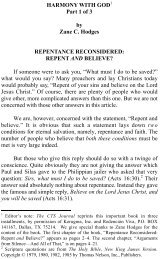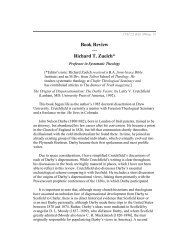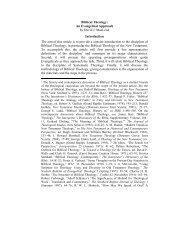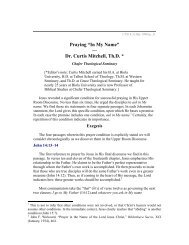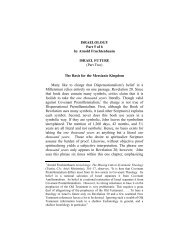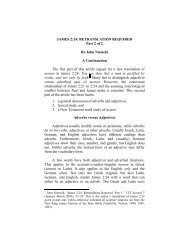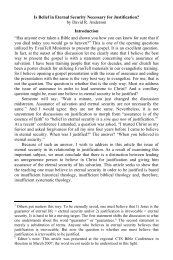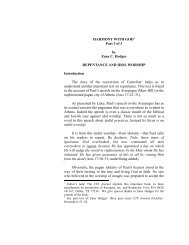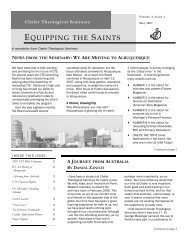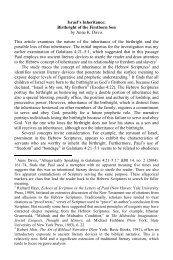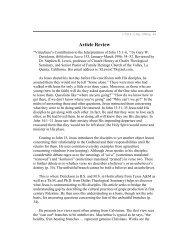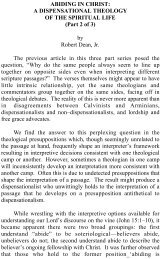WELCOME TO CHAFER THEOLOGICAL SEMINARY We extend a ...
WELCOME TO CHAFER THEOLOGICAL SEMINARY We extend a ...
WELCOME TO CHAFER THEOLOGICAL SEMINARY We extend a ...
You also want an ePaper? Increase the reach of your titles
YUMPU automatically turns print PDFs into web optimized ePapers that Google loves.
Page 42 Chafer Theological Seminary Catalog 2009-2011<br />
Election. <strong>We</strong> believe Scripture reveals two clear and indisputable lines of evidence. One line shows God<br />
sovereignly choosing His own in Christ; the other shows man possessing the function of volition, able to<br />
receive or reject God’s uniquely born Son (regarding sovereignty, see Job 42:2; Psalm 135:6; Isaiah 46:9–10;<br />
Jeremiah 1:5; Matthew 24:22, 24, 31; Luke 18:7; Romans 8:29–33; Galatians 1:15; 2 Timothy 2:10; 1 Peter<br />
1:1–2; regarding human volition, see John 1:9–13; 3:16, 36; 6:47; 20:30–31; Acts 16:30–31; Romans 10:11–<br />
13; 1 John 5:9–13, as well as every command in the epistles).<br />
Means of Salvation. <strong>We</strong> believe salvation is the gift of God brought to mankind by grace and received by<br />
personal faith in the Lord Jesus Christ, whose precious blood was shed for the forgiveness of our sins. God<br />
neither overrules nor implants mankind’s volition in accepting or rejecting His provision of salvation. A<br />
human being appropriates salvation by the sole means of faith alone in Jesus Christ alone, whose death and<br />
resurrection are the ground of man’s salvation. The means of salvation is to be properly correlated with and<br />
distinguished from issues related to discipleship (Acts 16:31; 4:12; John 1:12; 3:16, 18; 20:31; Ephesians<br />
1:7; 2:8–10; 1 Peter 1:18–19; 2 Peter 3:9; 1 John 5:11–12).<br />
No act of obedience (other than faith in Christ), whether preceding or following faith in the Lord Jesus<br />
Christ, such as commitment or willingness to obey, sorrow for sin, turning from sin, baptism, or submission<br />
to the Lordship of Christ, may be added to, or considered a part of, faith as a condition for receiving eternal<br />
salvation. The saving transaction between God and the sinner consists simply of the giving and receiving of a<br />
free gift that is without cost to the believer (John 4:10; Romans 4:5; Galatians 2:16; Ephesians 2:8–9; Titus<br />
3:5; Revelation 22:17).<br />
Eternal Security. A Christian, having believed in Christ as Savior at one moment in time, God forever keeps<br />
secure. However, God does discipline an erring son as a beloved child when necessary. Salvation once<br />
possessed cannot be lost. This belief in God’s merciful and secure salvation is not a license for careless living<br />
but, on the contrary, a powerful incentive for godly living (John 10:27–30; Romans 8:38–39; 12:1–2;<br />
1 Corinthians 1:4–9; 12:12; Hebrews 10:14; 12:6–13; 1 Peter 1:3–5).<br />
Assurance. One’s assurance of eternal salvation comes through faith in the promise God makes in His Word<br />
that everyone who trusts in Jesus Christ possesses eternal life. Good works, which can and should follow<br />
regeneration, are not necessary to a firm assurance of eternal life (John 5:24; 6:47; Ephesians 2:10; Titus 3:8;<br />
1 John 5:9–13).<br />
DISPENSATIONS<br />
The Study of God’s Oversight of History<br />
Dispensations are the divine administrations of human affairs from Adam through the end of time. Though<br />
time is not a primary consideration, each divine administration, or Dispensation, relates to a definite period of<br />
human history. The vast majority of the Bible deals with three such Dispensations: the Dispensation of Israel<br />
from the call of Abraham to Christ (which itself may be divided into the age of the patriarchs or promise and<br />
the age of the Law), the present Dispensation of the Church from Pentecost to the Rapture, and the future<br />
Dispensation of Christ’s 1000-year kingdom, theologically designated as the Millennium. There should be no<br />
blurring or confusion of Israel and the Church; God deals distinctly with each group (Genesis 12:1–3; John<br />
1:17; Acts 2; 1 Corinthians 10:32; Galatians 3:19; Ephesians 1:10; Revelation 20:1–7).<br />
Dispensations are not different ways of forgiveness and eternal life, but different administrations of God as<br />
He superintends the way mankind lives on earth. Eternal salvation was, is, and always will be a free gift by<br />
grace alone through faith alone in Jesus Christ alone (Ephesians 2:9–10).



